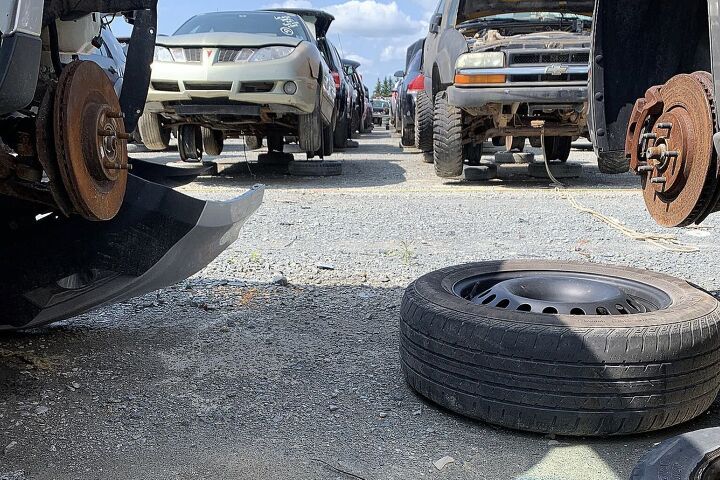We’re Poor and Drive Old Cars: Average Vehicle Age Continues to Rise

It seems most Americans are continuing to hang onto their cars for extended periods of time, with a new report suggesting the nation’s average vehicle age is 12.5 years. According to the crew at S&P Global Mobility, it’s the sixth straight year this number has increased.
Alert readers will know the reasons for this are myriad but not surprising. Recent supply chain challenges thanks to chip shortages and other headaches conspired to keep new vehicles off dealer lots for a spell, meaning some customers turned to the used market for replacement rigs. Sure, it might not make much difference to local statistics if Jim down the street bought a three-year-old Corolla instead of a new one but multiply that transaction by millions and it’ll absolutely affect the average age of vehicles on our roads.
Drilling down into the statistics, we learn the average light truck is slightly younger than the average passenger car – at least when it comes to internal combustion vehicles. EVs are understandably much newer, on average, than gasoline- or diesel-fuelled machines, an observation which makes perfect sense since EV sales have grown by leaps and bounds over the last few years. Twelve years ago, there was comparatively little selection. The current average age of EVs in America is roughly 3.6 years, says S&P.
Other factors? Money, of course. Average transaction prices have never been higher thanks to a confluence of tight supply, attendant dealer markups, and OEMs sometimes choosing to crank out profitable trims (when they could crank out any cars at all). Today’s inflation and interest rates don’t help, either; in a world where many customers buy on payment, being shown 8.99 percent instead of 1.49 percent on a four-square can make a significant dent in buying patterns.
After six years of steady increases, the research group suggests 2023 could kinda sorta maybe be an annum in which the trend reverses, albeit slightly. If production does ramp up and sales of new cars get back to some semblance of historic norms, it won’t take long for a flood of fresh metal to drive down the average age of vehicles on the road in America. We’ll note that some so-called experts mouthed the same prediction last year, and look how that turned out.
[Image: Author]
Become a TTAC insider. Get the latest news, features, TTAC takes, and everything else that gets to the truth about cars first by subscribing to our newsletter.

Matthew buys, sells, fixes, & races cars. As a human index of auto & auction knowledge, he is fond of making money and offering loud opinions.
More by Matthew Guy
Latest Car Reviews
Read moreLatest Product Reviews
Read moreRecent Comments
- Orange260z I'm facing the "tire aging out" issue as well - the Conti ECS on my 911 have 2017 date codes but have lots (likely >70%) tread remaining. The tires have spent quite little time in the sun, as the car has become a garage queen and has likely had ~10K kms put on in the last 5 years. I did notice that they were getting harder last year, as the car pushes more in corners and the back end breaks loose under heavy acceleration. I'll have to do a careful inspection for cracks when I get the car out for the summer in the coming weeks.
- VoGhost Interesting comments. Back in reality, AV is already here, and the experience to date has been that AV is far safer than most drivers. But I guess your "news" didn't tell you that, for some reason.
- Doc423 Come try to take it, Pal. Environmental Whacko.
- 28-Cars-Later Mazda despite attractive styling has resale issues - 'Yota is always the answer.
- 28-Cars-Later Try again.

































Comments
Join the conversation
I just recently took one of our vehicles in to fix an oil leak. The car has 100k on the clock. I told the mechanic that if he takes a "wear part" off the car - replace it with new.
$3k later the oil leak is fixed, valve covers and timing chain cover resealed, new timing chains and guides, new water pump and oil cooler installed.
20 years ago I would have probably just traded the car. Today, spending $50k to avoid repairs like these doesn't make sense.
We plan to keep our cars beyond 200k miles. New car prices are the primary reason for that. New cars simply are not a good value unless you keep them a long time.
My cars are 12, 13, & 18 years old and all in great mechanical shape such that I would go off on a cross-country road trip in any of them. Only 1 has over 100k miles right now. I have no payments and no real reason to start one, even though I could without breaking my bank (I would LOVE to drive off with a new F-150).
A new vehicle purchase only makes sense if kept for 8 or more years. The last new truck I bought lasted 20 years and 183k miles before transmission failure.